04 Nov2022
By Michael Staton
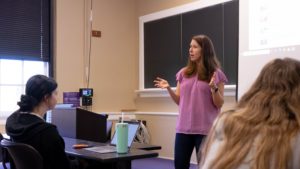 This article was originally published by Clemson News and is reprinted with permission.
This article was originally published by Clemson News and is reprinted with permission.
Catherine Griffith serves as a clinical associate professor of special education in the Department of Education and Human Development at Clemson University. She coordinates the Master of Education program in Special Education with emphases in academic and behavioral interventions and teaches coursework on individuals with learning disabilities and emotional and behavioral disorders, intensive academic interventions, and applied behavior analysis.
31 Oct2022
By Kaitlyn Brennan
The new “In the States” feature by Kaitlyn Brennan is a weekly update to keep members informed on state-level activities impacting the education and educator preparation community.
States and districts around the country continue to scramble to fill teaching positions with fully certified, profession ready educators. A recent analysis from the Southern Regional Education Board of 2019-20 data in 11 states found roughly 4% of teachers — which could be up to 56,000 educators — were uncertified or teaching with an emergency certification. By 2030, the number of uncertified teachers or those teaching with an emergency certification is expected to balloon. The Southern Regional Education Boards projects that upwards of 16 million K-12 students in the Southern region of the country could be taught by an unprepared or inexperienced teacher. While the pandemic certainly exacerbated the problem, it is not new and has steadily gotten worse over the last decade. For example, in Texas school districts’ reliance on uncertified new hires increased significantly over the last decade. In the 2011-12 school year, fewer than 7% of the state’s new teachers — roughly 1,600 — didn’t have a certification. By last year, about 8,400 of the state’s nearly 43,000 new hires were uncertified.
25 Oct2022
By Jessica Jackson
Understanding learner variability helps disrupt the idea of a one-size-fits all approach and paves the way for more equitable teaching and learning. The intersection of culturally responsive practice with the science of learner variability can provide great insight into what it takes to successfully implement culturally responsive instruction with both teachers and students. It also helps us understand why culturally responsive practices are necessary for reaching and embracing the whole learner.
On November 10, 2022 at 1:00 p.m., we will hear from our distinguished panelists, Courtney Teague, Angela Elkordy, and Leigh Ann Erikson, on how they approach culturally responsive practice in their courses and practice. We’ll discuss some of the key findings from the research on culturally responsive practices, where the research gaps are, and the importance of culturally responsive practices in teacher education and K-12 classrooms. Register today for the Learner Variability and Culturally Responsive Practices, hosted by Digital Promise and AACTE.
21 Oct2022
By Lisa Buie
This article originally appeared on reimaginED, the policy and public affairs communications platform for Step Up For Students and is reprinted with permission.
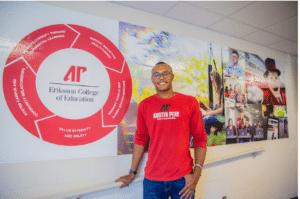
The Early Learning Residency Program at Austin Peay University proved to be what recent graduate Malachi Johnson was looking for: a college education and a guaranteed job.
In her 20s, Heather Fracker set her sights on becoming a respiratory therapist. But as John Lennon observed, “Life is what happens when you’re busy making other plans.”
Fast forward two decades, and Fracker, a 43-year-old single mom to two middle schoolers, is pursuing a new dream. In two years, she will be a fully credentialed elementary school teacher thanks to an accelerated program that began in her hometown.
18 Oct2022
The U.S. Department of Education Grant Will Fund Master of Arts in Teaching and Master of Education for Principals Programs.
By High Point University
High Point University’s Stout School of Education is a recipient of a nearly $10 million grant from the U.S. Department of Education to fund two graduate programs for teachers and principals for the next five years. The school will receive $9,786,041, the second largest federal Teacher Quality Partnership grant awarded to 22 universities in the nation.
The Teacher Quality Partnership grant is the largest competitive grant ever awarded to High Point University, says Amy Holcombe, dean of the Stout School of Education. This is the second Teacher Quality Partnership Grant awarded to HPU’s Stout School of Education, which received a previous $4 million grant in October 2018.
14 Oct2022
By Kristien Zenkov
The Teacher Educators’ Journal (TTEJ) is published by the Virginia Association of Colleges and Teacher Educators (VACTE), a state unit of the Association of Teacher Educators (ATE) and the American Association of Colleges for Teacher Education (AACTE). The journal aims to stimulate discussion and reflection about issues related to teacher education; authors need not be based in and research need not be conducted in Virginia for manuscripts to be considered for publication. Manuscripts submitted for consideration may be research/empirical reports and analyses, position papers, book reviews, or conceptual essays.
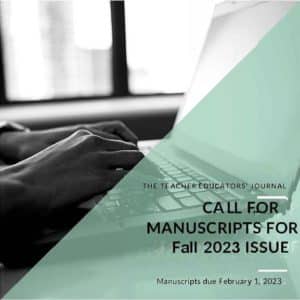 To facilitate collaboration amongst teacher education scholars and practitioners and improve teaching, research, and student learning, the Fall 2023 special issue of the journal will call on authors to address two related sub-themes in two distinct sections.
To facilitate collaboration amongst teacher education scholars and practitioners and improve teaching, research, and student learning, the Fall 2023 special issue of the journal will call on authors to address two related sub-themes in two distinct sections.
- Section I: The sub-theme for this section is “Opportunity Gaps and Collaborative Inquiry: Structures, Explorations, and Early Outcomes of the ATE Inquiry Initiative.”
- Section II: The sub-theme for this section is “From Policy to Practice: Striving for Inclusive Excellence through Personal Reflection, Connectivity, and the Building of Support Systems for Leaders, Educators, Students, and Families.”
05 Oct2022
By Kyle Sears
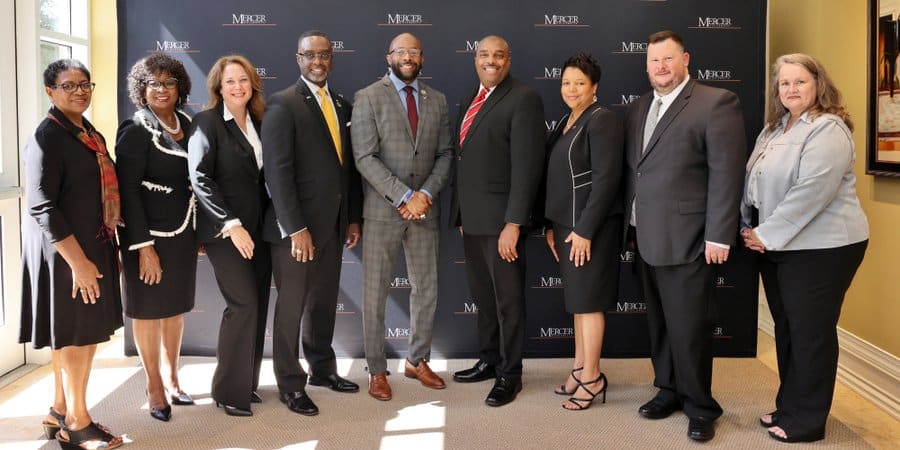 Mercer University’s Tift College of Education will partner with five local school districts on a three-year, $9.6 million U.S. Department of Education grant project aimed at strengthening the teacher pipeline in order to increase and diversify the teaching workforce.
Mercer University’s Tift College of Education will partner with five local school districts on a three-year, $9.6 million U.S. Department of Education grant project aimed at strengthening the teacher pipeline in order to increase and diversify the teaching workforce.
The award is the largest federal grant in the history of the College of Education, which was formed by the merger of Tift College with Mercer in 1986 and is the largest private preparer of teachers and other educators in Georgia.
03 Oct2022
By Brooke Evans
 AACTE’s Committee on Global Diversity is proud to host the University of Missouri-St Louis, College of Education, recipient of the 2022 AACTE Best Practice Award in Support of Global & International Perspectives. This award, sponsored by AACTE’s Committee on Global Diversity, recognizes exemplary practice in the intercultural, global, cross-cultural, and international arenas and is presented each year at AACTE’s Annual Meeting.
AACTE’s Committee on Global Diversity is proud to host the University of Missouri-St Louis, College of Education, recipient of the 2022 AACTE Best Practice Award in Support of Global & International Perspectives. This award, sponsored by AACTE’s Committee on Global Diversity, recognizes exemplary practice in the intercultural, global, cross-cultural, and international arenas and is presented each year at AACTE’s Annual Meeting.
The College of Education at the University of Missouri-St. Louis launched a year-long effort to enhance the internationalizing of teacher preparation programs. The main objectives were to initiate a professional learning community centered on globally competent teaching, integrate global perspectives in teacher education programs, create and share globally infused curricula, and strengthen international partnerships. The project was a comprehensive approach targeting faculty, staff, and students. In this webinar, they will share four of the initiatives from their year.=
On Thursday, October 6, join AACTE and the Committee on Global Diversity in welcoming the University of Missouri, St Louis College of Education faculty and staff as they share their experience with AACTE membership. Register today.
26 Sep2022
By Weade James
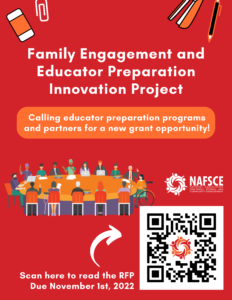 The National Association for Family, School, and Community Engagement (NAFSCE) is seeking proposals from educator preparation programs and their school and community partners to take part in the Family Engagement Educator Preparation Innovation Project.
The National Association for Family, School, and Community Engagement (NAFSCE) is seeking proposals from educator preparation programs and their school and community partners to take part in the Family Engagement Educator Preparation Innovation Project.
23 Sep2022
By U.S. Department of Education
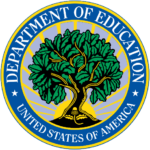 The U.S. Department of Education has announced new awards to help recruit, prepare, develop, and retain a strong, effective and diverse teacher workforce for classrooms across the country through the Teacher Quality Partnership (TQP) grant program. This year’s investment includes 22 new five-year grants totaling $24.8 million through its TQP program. The award recipients represent IHEs and national nonprofits, including three HBCUs and one MSI.
The U.S. Department of Education has announced new awards to help recruit, prepare, develop, and retain a strong, effective and diverse teacher workforce for classrooms across the country through the Teacher Quality Partnership (TQP) grant program. This year’s investment includes 22 new five-year grants totaling $24.8 million through its TQP program. The award recipients represent IHEs and national nonprofits, including three HBCUs and one MSI.
23 Sep2022
University will be only UNC System institution to operate two lab school programs
By Anna Oakes

Courtesy of Marie Freeman
Appalachian State University is partnering with Elkin City Schools to open the university’s second laboratory school aimed at enhancing student education, improving outcomes and providing high-quality teacher and principal training.
Under the plan — which was developed in collaboration with Elkin City Schools leaders and approved by the Elkin City Schools Board of Education on Dec. 13, 2021 — a lab school will open at Elkin Elementary School in August. The “school-within-a-school” model will serve approximately 100 students in second through fourth grades.
23 Sep2022
As higher ed enrollment lags, colleges try to make teacher preparation more enticing, sustainable to ward off local shortages
By Marianna McMurdock
This story was produced by The 74, a non-profit, independent news organization focused on education in America.

The pandemic has exacerbated a troubling national trend: Fewer potential teachers are entering the profession.
Nearly every state lost a large proportion of teaching candidates between 2010 and 2018, according to a Center for American Progress report — and the pandemic has further strained traditional colleges and universities programs, many of which face declining enrollment and were forced to recently cut staff.
15 Sep2022
By Karen B. Cotton
This article was originally published by Prairie View A&M University.
The teacher population in Texas does not reflect its student population. Beverly Sande, Ph.D., plans to change that statistic with $300,000 in funding from Texas Tech University–Texas Education Agency in collaboration with the University-School Partnerships for the Renewal of Educator Preparation (US PREP) National Center. The award will position Prairie View A&M University (PVAMU) to lead innovative efforts to increase diversity among the number of teachers.
15 Sep2022
By Shea Kerkhoff

The AACTE Committee on Global Diversity is hosting Internationalizing Education in Teacher Preparation, an October 6 webinar featuring the University of Missouri, St Louis College of Education faculty and staff, including Shea Kerkhoff. Below Kerkhoff outlines four initiatives they implemented to integrate a global perspective into its educator preparations programs.
Classrooms in St. Louis, like most of the country, are globally diverse and connected. Realizing the importance of including global perspectives and fostering international connections, the College of Education at the University of Missouri – St. Louis launched a year-long effort to enhance the internationalizing of our teacher preparation programs. The main objectives were to initiate a professional learning community centered on globally competent teaching, integrate global perspectives in our teacher education programs, create and share globally infused curricula, and strengthen international partnerships. The project was a comprehensive approach targeting faculty, staff, and students. Here we will share four of the initiatives from our year.
15 Sep2022
In 74 Interview, author Leslie T. Fenwick said the effects were so damaging that ‘the nation’s public schools still have not recovered’
By Greg Toppo
This story was produced by The 74, a non-profit, independent news organization focused on education in America.
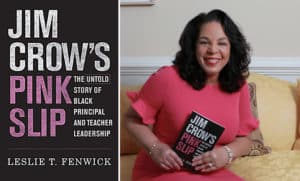 American students have attended school for nearly 70 years under the U.S. Supreme Court’s historic 1954 Brown v. Board of Education decision, which outlawed racial segregation in public schools. But a new book uncovers a little-known by-product of the case: Educators and policymakers in at least 17 states that operated separate “dual systems” of schools defied the spirit of Brown by closing schools that served Black students and demoting or firing an estimated 100,000 highly credentialed Black principals and teachers.
American students have attended school for nearly 70 years under the U.S. Supreme Court’s historic 1954 Brown v. Board of Education decision, which outlawed racial segregation in public schools. But a new book uncovers a little-known by-product of the case: Educators and policymakers in at least 17 states that operated separate “dual systems” of schools defied the spirit of Brown by closing schools that served Black students and demoting or firing an estimated 100,000 highly credentialed Black principals and teachers.
In Jim Crow’s Pink Slip, scholar Leslie T. Fenwick, tapping seldom-seen transcripts from a series of 1971 U.S. Senate hearings on the topic, writes that the loss of Black educators post-Brown was “the most significant brain drain from the U.S. public education system that the nation has ever seen. It was so pervasive and destabilizing that, even more than half-century later, the nation’s public schools still have not recovered.”
 This article was originally published by Clemson News and is reprinted with permission.
This article was originally published by Clemson News and is reprinted with permission.







 To facilitate collaboration amongst teacher education scholars and practitioners and improve teaching, research, and student learning, the Fall 2023 special issue of the journal will call on authors to address two related sub-themes in two distinct sections.
To facilitate collaboration amongst teacher education scholars and practitioners and improve teaching, research, and student learning, the Fall 2023 special issue of the journal will call on authors to address two related sub-themes in two distinct sections. Mercer University’s
Mercer University’s 
 The National Association for Family, School, and Community Engagement (NAFSCE) is seeking proposals from educator preparation programs and their school and community partners to take part in the Family Engagement Educator Preparation Innovation Project.
The National Association for Family, School, and Community Engagement (NAFSCE) is seeking proposals from educator preparation programs and their school and community partners to take part in the Family Engagement Educator Preparation Innovation Project.  The U.S. Department of Education has announced new awards to help recruit, prepare, develop, and retain a strong, effective and diverse teacher workforce for classrooms across the country through the Teacher Quality Partnership (TQP) grant program. This year’s investment includes 22 new five-year grants totaling $24.8 million through its TQP program. The award recipients represent IHEs and national nonprofits, including three HBCUs and one MSI.
The U.S. Department of Education has announced new awards to help recruit, prepare, develop, and retain a strong, effective and diverse teacher workforce for classrooms across the country through the Teacher Quality Partnership (TQP) grant program. This year’s investment includes 22 new five-year grants totaling $24.8 million through its TQP program. The award recipients represent IHEs and national nonprofits, including three HBCUs and one MSI.

